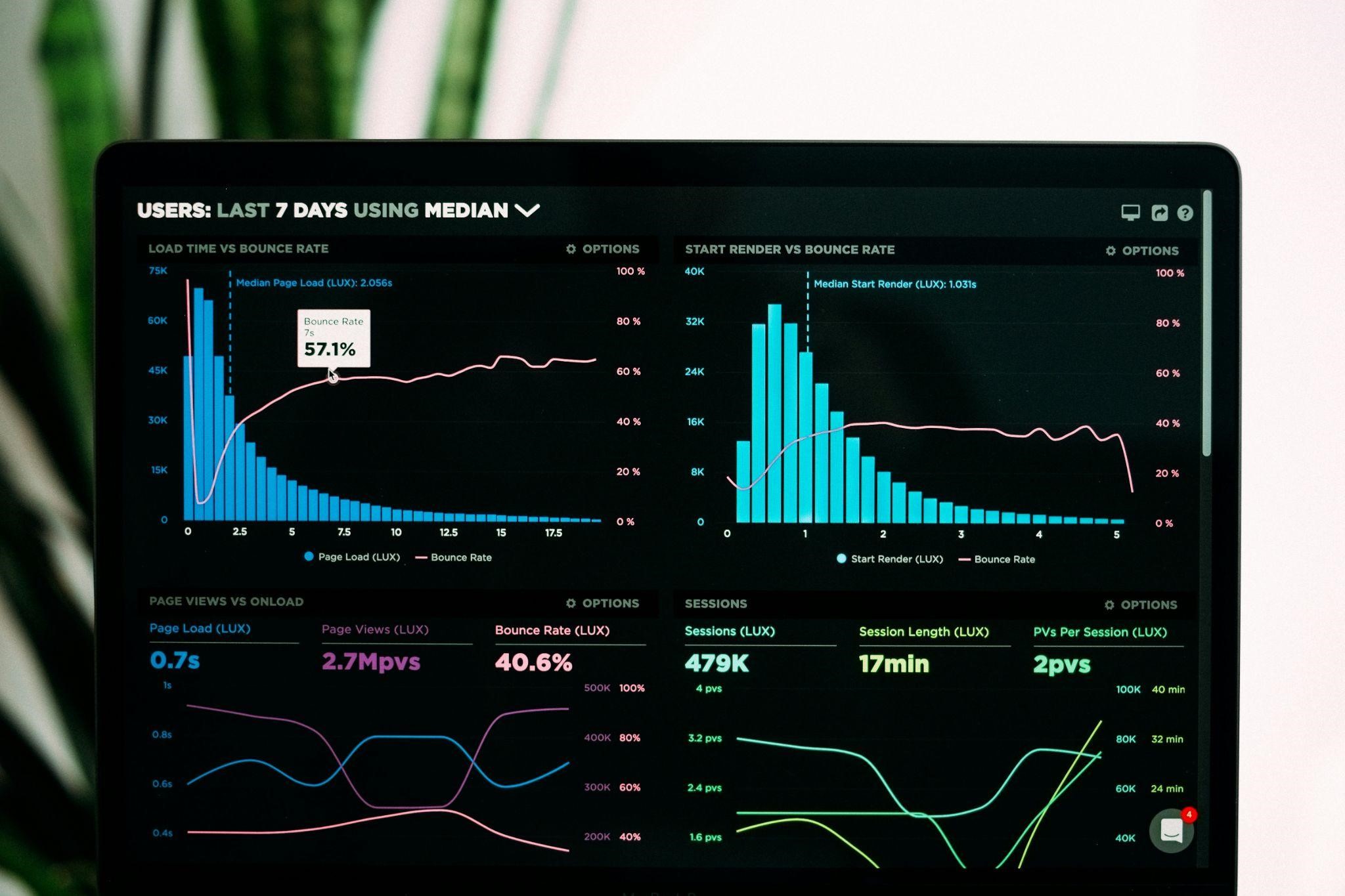
Photo by Markus Spiske on Unsplash
To say that the digital era has seen an unprecedented expansion in data creation is an understatement of epic proportions. It has led to transformative changes across various industries; one such sector experiencing significant shifts due to big data is eCommerce. Here, we explore exactly how big data is revolutionizing the way businesses operate online.
Big data enables eCommerce businesses to analyze (unimaginably) vast amounts of information about customer behavior, preferences, and past purchases. This data is then used to tailor shopping experiences, offer personalized recommendations, and send targeted marketing messages - as a result, customers enjoy a more customized shopping journey, which increases satisfaction and loyalty. With the rise of features like a shoppable Instagram feed, businesses can seamlessly integrate these insights into social media platforms, further enhancing the customer experience.
It’s important to note, however, that 85% of brands believe they provide personalized experiences, while only 60% of consumers agree, indicating a gap in perceived personalization effectiveness.
Dynamic pricing is a strategy where prices are adjusted in real-time based on supply, demand, and customer behavior; 56% of online customers are more likely to return to a site that offers personalized product recommendations, which is a key component of dynamic pricing strategies. Big data analytics provide insights into market trends, consumer purchasing patterns, and competitor pricing, which help businesses optimize their pricing strategies to maximize profits while remaining competitive.
Big data facilitates more efficient supply chain management by predicting demand, monitoring inventory levels, and tracking shipments in real-time. Big data has been instrumental in improving forecast accuracy, better managing logistics capacity needs, and reducing inventory levels and obsolescence in various companies, as evidenced by the use of advanced forecasting methods in retail sectors, like those implemented by Blue Yonder. Additionally, real-time big data tracking plays a crucial role in optimizing supply chain processes, enhancing visibility, and improving decision-making. This data-driven approach reduces overstocking and stockouts, minimizes shipping delays, and lowers costs, ultimately enhancing the overall efficiency of supply chain operations.
According to research published by McKinsey, businesses that provide personalized customer experiences see a 20% increase in customer satisfaction. Big data tools can predict customer inquiries and issues by analyzing interaction history and consumer sentiment. This proactive approach enables businesses to address concerns before they escalate, improving customer service. Moreover, chatbots and virtual assistants powered by AI and big data can provide instant support and resolve issues quickly, enhancing customer satisfaction.
For businesses looking to implement or optimize such AI-driven customer service solutions, AI consulting companies can provide the necessary expertise in developing and deploying these technologies effectively.
Long gone are the days of physical security being the only concern for a retail outfit. With the increasing number of transactions online, eCommerce platforms are becoming prime targets for fraud. Big data analytics help in identifying patterns that indicate fraudulent activity. By analyzing transaction data and customer behavior, eCommerce businesses can flag unusual activities and prevent potential fraud, thereby securing both the business and its customers.
According to a 2021 Acquia survey, 54% of marketers report better brand engagement due to increased personalization efforts, which big data facilitates. Big data allows businesses to understand the effectiveness of different marketing channels and strategies by analyzing engagement and conversion data. This insight helps companies to invest wisely in marketing campaigns that are more likely to succeed, ensuring better ROI and more effective use of marketing budgets.
As reported by Adobe, 43% of organizations with extensive personalization efforts see significantly greater retention improvements. By examining data on customer interactions, purchase history, and feedback, businesses can identify at-risk customers and implement retention strategies tailored to keep them engaged, such as re-engagement campaigns for those considering unsubscribing from emails. Big data tools enable the prediction of customer churn and facilitate the development of personalized offers and services to increase customer loyalty.

Photo by Luke Chesser on Unsplash
Big data tools analyze a broad spectrum of information, including social media data, to gauge consumer sentiment and spot emerging trends; 70% of customers reportedly believe that how well a firm recognizes their individual needs influences their loyalty, indicating the importance of market trend analysis through big data. This ability to swiftly identify and react to market changes gives eCommerce businesses that all-important competitive edge, enabling them to capitalize on trends before they become mainstream.
Real-time customer analytics are revolutionizing the way eCommerce businesses interact with their customers. By capturing and analyzing data about customer actions as they occur, companies can make immediate adjustments that enhance the shopping experience.This includes dynamically presenting products, offering real-time discounts, or even suggesting platforms where users can buy crypto securely and instantly.
The transformative power of real-time analytics lies in its ability to provide actionable insights that are virtually immediate - especially when compared to the increasingly antiquated traditional methods. For instance, if a customer spends a considerable amount of time on a specific product page but does not make a purchase, the system can prompt a live chat support offer or a limited-time discount to help close the sale. Similarly, if a customer frequently buys a particular type of product, real-time analytics can push related products or accessories to their view, enhancing the likelihood of additional purchases.
This approach not only boosts customer engagement by making interactions more relevant and timely but also increases conversion rates and enhances overall customer satisfaction. As businesses continue to gather more granular data on customer preferences and behaviors, the potential for customized shopping experiences becomes even more profound, turning casual browsers into loyal customers. Real-time customer analytics thus stand as a cornerstone in leveraging big data for personalized marketing and a superior customer journey in the realm of eCommerce.
The integration of the Internet of Things (IoT) with eCommerce is a significant leap forward in harnessing big data for enhanced consumer experiences. IoT devices - such as smart home assistants, wearables, and connected appliances - all collect a vast array of data points from everyday consumer activities. This data provides deep insights into consumer habits and preferences, which eCommerce platforms can use to tailor experiences, offers, and products more effectively.
For example, smart refrigerators can track consumption patterns and expiry dates, automatically suggesting reorders at optimal times directly via an eCommerce platform. Similarly, wearable devices that monitor health and fitness activities can recommend health and wellness products based on the user’s activities and goals.
Furthermore, IoT can enhance operational efficiency beyond customer-facing features. Smart sensors in warehouses optimize inventory management by tracking product movement and stock levels in real-time. This integration allows for automated restocking processes, predictive maintenance, and streamlined logistics, all of which contribute to cost reductions and improved service delivery.
The potential for IoT in eCommerce extends into personalized marketing and customer engagement. By analyzing data from IoT devices, businesses can send personalized notifications and offers to consumers based on their current context or activity. For instance, offering discounts on sportswear as a user finishes a run tracked by their smartwatch.

Photo by My name is Yanick on Unsplash
Augmented Reality (AR) and Virtual Reality (VR) technologies are dramatically enhancing the eCommerce landscape by offering up ultra-immersive shopping experiences that could once have only been dreamed up in the realm of science fiction. Powered by big data, these technologies enable customers to visualize products in a real-life context before making a purchase. Visualization this immersive goes a long way in bridging the gap between the digital and physical shopping experiences.
AR allows customers to see how a product would look in their own environment. For instance, a furniture retailer can use AR to enable customers to see how a couch would look in their living room, adjusting colors and styles with a simple swipe on their mobile device. This not only enhances engagement but also significantly reduces the likelihood of returns since customers have a clearer expectation of the product.
On the other hand, VR provides a fully immersive experience through which customers can leisurely stroll about a virtual store from the comfort of their homes; they can interact with products, customize options, and even experience how the products work in a simulated environment. For example, an outdoor gear shop might use VR to show customers a virtual camping environment where they can test different tents and gear setups under various weather conditions.
By understanding which features attract more interaction or which products get more virtual "try-ons," businesses can adjust their stock levels, marketing strategies, and product development accordingly.
Moreover, the integration of AR and VR with big data analytics helps in creating more personalized shopping journeys. Based on the data gathered from a customer’s previous interactions, personalized virtual stores can be set up to highlight products of their interest automatically, making the shopping process more efficient and enjoyable.
In physical retail environments, store security cameras play a critical role not only in deterring theft and protecting merchandise but also in gathering valuable data on customer behavior, store traffic patterns, and product engagement—insights that can be leveraged alongside AR and VR analytics to further optimize both in-store and online shopping experiences
Big data transcends its status as a mere buzzword to become a pivotal element in eCommerce; it enables businesses to make data-driven decisions, customize customer interactions, optimize operational workflows, and bolster security measures. As technological advancements progress, the influence of big data within the eCommerce sector is set to expand, transforming the industry in ways that are currently only in the realm of speculation.
Disclaimer: The views expressed herein are for reference only and don't necessarily represent the official views of Alibaba Cloud.
Streamlining Enterprise Workflows on Alibaba Cloud with Intelligent eSignatures
Alibaba Clouder - April 1, 2021
Alibaba Cloud MaxCompute - October 18, 2021
5251873121041033 - November 8, 2019
Alex - June 18, 2020
Alibaba Cloud Community - November 3, 2021
Alibaba Clouder - April 1, 2021
 Big Data Consulting Services for Retail Solution
Big Data Consulting Services for Retail Solution
Alibaba Cloud experts provide retailers with a lightweight and customized big data consulting service to help you assess your big data maturity and plan your big data journey.
Learn More Alibaba Cloud for Supply Chain
Alibaba Cloud for Supply Chain
Improve the transparency, efficiency, and sustainability of your supply chain with Alibaba Cloud
Learn More E-Commerce Solution
E-Commerce Solution
Alibaba Cloud e-commerce solutions offer a suite of cloud computing and big data services.
Learn MoreMore Posts by Neel_Shah